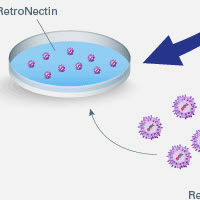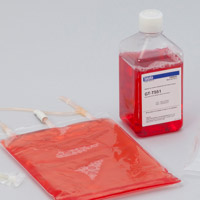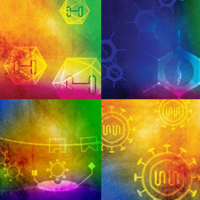Anti-CD3 monoclonal antibody (OKT3)

The anti-CD3 monoclonal antibody (OKT3) recognizes CD3, a human glycoprotein and member of the Ig superfamily—primarily expressed on T cells, some NKT cells, and thymocytes during T-cell differentiation. Binding of an anti-CD3 monoclonal antibody to CD3 stimulates T-cell activation. Anti-CD3 antibodies (the OKT3 clone in particular) are used to expand T cells in culture for use in adoptive immunotherapy. CD8+ T-cell expansion can be further enhanced by costimulation with RetroNectin reagent.
The anti-CD3 monoclonal antibody (OKT3) recognizes CD3, a human glycoprotein and member of the Ig superfamily—primarily expressed on T cells, some NKT cells, and thymocytes during T-cell differentiation. Binding of an anti-CD3 monoclonal antibody to CD3 stimulates T-cell activation. Anti-CD3 antibodies (the OKT3 clone in particular) are used to expand T cells in culture for use in adoptive immunotherapy. CD8+ T-cell expansion can be further enhanced by costimulation with RetroNectin reagent.
This product is manufactured as a quality-assured product according to relevant guidelines for Good Manufacturing Practice (GMP), and is, therefore, suitable for ex vivo cell culture processing and gene therapy studies.
Overview
- T210, Anti-CD3 mAb GMP grade (OKT3 antibody), is manufactured and tested in accordance with the following guidelines, "Standards for Manufacturing Control and Quality Control, etc. of Investigational Products (Investigational products GMP)" notified by the Ministry of Health and Welfare Japan ("PFSB Notification No. 0709002, July 9, 2008") (PFSB: Pharmaceutical and Food Safety Bureau)
- With the exception of mouse hybridoma cells, we do not use any human- or animal-derived materials during the production of Anti-CD3 mAB GMP grade.
- Clinical-grade anti-CD3 mAb (GMP) can be used for ex vivo cell culture processing (investigational use only); please complete and return this form prior to purchase
- Can be used in combination with RetroNectin GMP grade to enhance T-cell (CD8+) expansion efficiency in culture
More Information
Applications
T-cell expansion
Product citations
Chen, D. et al. Cytokine-induced killer cells as a feasible adoptive immunotherapy for the treatment of lung cancer. Cell Death Dis. 9, 336 (2018).
Chono, H. et al. Optimization of lentiviral vector transduction into peripheral blood mononuclear cells in combination with the fibronectin fragment CH-296 stimulation. J. Biochem. 149, 285–292 (2011).
Ciceri, F. et al. Infusion of suicide-engineered donor lymphocytes after family haploidentical haemopoietic stem-cell transplantation for leukaemia (the TK007 trial): a non-randomized phase I-II study. Lancet Oncol. 10, 489–500 (2009).
Dodo, K. et al. An efficient large-scale retroviral transduction method involving preloading the vector into a RetroNectin-coated bag with low-temperature shaking. PLoS One 9, e86275 (2014).
Dudley, M. E. et al. Adoptive cell transfer therapy following non-myeloablative but lymphodepleting chemotherapy for the treatment of patients with refractory metastatic melanoma. J. Clin. Oncol. 23, 2346–57 (2005).
Jia, H., Tian, Y., Jiang, C. G. & Han, W. Evaluation of 29 indicators for the prognosis of advanced non-small cell lung cancer with cytokine-induced killer cell therapy combined with chemotherapy. Exp. Ther. Med. 11, 1601–1610 (2016).
Kawamura, A. et al. Six-year disease-free survival of a patient with metastatic eyelid squamous cell carcinoma and colon adenocarcinoma after repeated postoperative adoptive immunotherapy. Jpn. J. Clin. Oncol. 30, 267–271 (2000).
Lamers, C. H. J., Willemsen, R. A., Luider, B. A., Debets, R. & Bolhuis, R. L. H. Protocol for gene transduction and expansion of human T lymphocytes for clinical immunogene therapy of cancer. Cancer Gene Ther. 9, 613–623 (2002).
Li, J. et al. Autologous cytokine-induced killer cell transfusion in combination with gemcitabine plus cisplatin regimen chemotherapy for metastatic nasopharyngeal carcinoma. J. Immunother. 35, 189–195 (2012).
Minagawa, A. et al. Enhancing T cell receptor stability in rejuvenated iPSC-derived T cells improves their use in cancer immunotherapy. Cell Stem Cell 23, 850–858.e4 (2018).
Additional product information
Please see the product's Certificate of Analysis for information about storage conditions, product components, and technical specifications. Please see the Kit Components List to determine kit components. Certificates of Analysis and Kit Components Lists are located under the Documents tab.

T-cell expansion
RetroNectin Recombinant Human Fibronectin Fragment and RetroNectin GMP grade have widespread use as enhancers of retroviral or lentiviral gene transfer into hard-to-transduce cell types. Here, we present data on an additional application—the improved expansion of T cells from PBMCs and increased production of naïve T cells—using a combination of our products: GT-T551 T-cell medium, RetroNectin reagent, CultiLife culture bags, and anti-CD3 antibody.
T-cell expansion tech note Related products
Scale up transduction of hematopoietic cells with CultiLife culture bags
CultiLife culture bags provide a closed, sterile, gas-permeable system that reduces the risk of culture contamination and user exposure to cell culture materials. A 300-ml format (which can be coated with RetroNectin reagent) is available for high-efficiency viral transduction of hematopoietic cells and a 1,000-ml format can be used to expand cell cultures following transduction. View our protocol and see how to set up your cell culture in a single small bag and then expand it into multiple larger bags.
View protocol and specifications Buy nowTakara Bio USA, Inc.
United States/Canada: +1.800.662.2566 • Asia Pacific: +1.650.919.7300 • Europe: +33.(0)1.3904.6880 • Japan: +81.(0)77.565.6999
FOR RESEARCH USE ONLY. NOT FOR USE IN DIAGNOSTIC PROCEDURES. © 2025 Takara Bio Inc. All Rights Reserved. All trademarks are the property of Takara Bio Inc. or its affiliate(s) in the U.S. and/or other countries or their respective owners. Certain trademarks may not be registered in all jurisdictions. Additional product, intellectual property, and restricted use information is available at takarabio.com.







